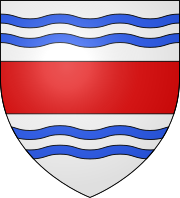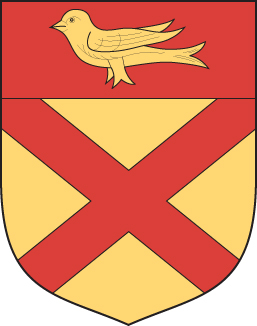
Baron Aberdare, of Duffryn in the County of Glamorgan, is a title in the Peerage of the United Kingdom. It was created on 23 August 1873 for the Liberal politician Henry Bruce. He served as Home Secretary from 1868 to 1873.
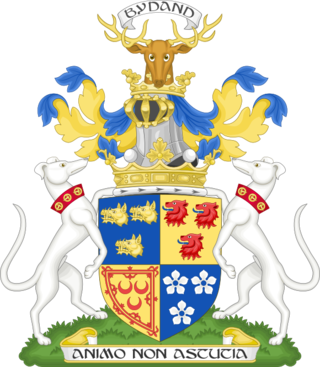
Marquess of Huntly is a title in the Peerage of Scotland that was created on 17 April 1599 for George Gordon, 6th Earl of Huntly. It is the oldest existing marquessate in Scotland, and the second-oldest in the British Isles; only the English marquessate of Winchester is older. The Marquess holds the following subsidiary titles: Lord Gordon of Strathaven and Glenlivet and Earl of Aboyne, and Baron Meldrum, of Morven in the County of Aberdeen.

Earl of Carlisle is a title that has been created three times in the Peerage of England.

Marquess of Anglesey is a title in the Peerage of the United Kingdom. It was created in 1815 for Henry Paget, 2nd Earl of Uxbridge, a hero of the Battle of Waterloo, second in command to the Duke of Wellington. The Marquess holds the subsidiary titles of Earl of Uxbridge, in the County of Middlesex, in the Peerage of Great Britain (1784), Baron Paget, de Beaudesert, in the Peerage of England (1553). He is also an Irish Baronet, of Plas Newydd in the County of Anglesey and of Mount Bagenall in the County of Louth.

Marquess of Cholmondeley is a title in the Peerage of the United Kingdom. It was created in 1815 for George Cholmondeley, 4th Earl of Cholmondeley.

Earl Waldegrave is a title in the Peerage of Great Britain. It was created in 1729 for James Waldegrave, 2nd Baron Waldegrave.

Earl of Wharncliffe, in the West Riding of the County of York, is a title in the Peerage of the United Kingdom.

Earl Granville is a title that has been created twice, once in the Peerage of Great Britain and once in the Peerage of the United Kingdom. It is now held by members of the Leveson-Gower family.

Earl of Stradbroke, in the County of Suffolk, is a title in the Peerage of the United Kingdom. It was created in 1821 for John Rous, 1st Baron Rous, who had earlier represented Suffolk in the House of Commons.

Earl of Effingham, in the County of Surrey, is a title in the Peerage of the United Kingdom, created in 1837 for Kenneth Howard, 11th Baron Howard of Effingham, named after the village of Effingham, Surrey, where heads of the family owned the manor.

Baron Brownlow, of Belton in the County of Lincoln, is a title in the Peerage of Great Britain. It was created in 1776 for Sir Brownlow Cust, 4th Baronet. The Cust family descends from Richard Cust (1622–1700) of The Black Friars, Stamford, who represented Lincolnshire and Stamford in Parliament. In 1677 he was created a baronet, "of Stamford in the County of Lincoln". He was succeeded by his grandson Richard Cust, 2nd Baronet, who married Anne Brownlow, daughter of Sir William Brownlow, 4th Baronet, "of Humby", Lincolnshire, and sister and sole heiress of John Brownlow, 1st Viscount Tyrconnel, 5th Baronet of Belton House, Lincolnshire. The 2nd Baronet's son Sir John Cust, 3rd Baronet, sat as a Member of Parliament for Grantham and served as Speaker of the House of Commons from 1761 to 1770 and in 1754 inherited the Brownlow estates, including Belton, on the death of his childless maternal uncle Viscount Tyrconnel. His son Brownlow Cust, 4th Baronet, represented Ilchester, Somerset, and Grantham in Parliament and in 1776 was raised to the peerage as Baron Brownlow, "of Belton in the County of Lincoln", chiefly in recognition of his father's services. He was succeeded by his son John Cust, 2nd Baron Brownlow, who had sat as a Member of Parliament for Clitheroe, Lancashire, and also served as Lord Lieutenant of Lincolnshire for many years. In 1815 he was created Viscount Alford, "in the County of Lincoln", and Earl Brownlow, both in the Peerage of the United Kingdom. In 1810 the future 1st Earl had married Sophia Hume, a daughter of Sir Abraham Hume, 2nd Baronet, of Wormleybury, by his wife Lady Amelia Egerton, a great-granddaughter of John Egerton, 3rd Earl of Bridgewater.
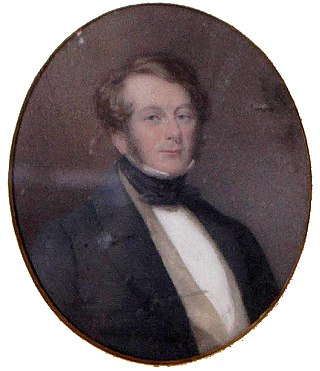
Edward Granville Eliot, 3rd Earl of St Germans, styled Lord Elliot from 1823–45, was a British politician, peer, and diplomat.

William Eliot, 2nd Earl of St Germans, styled as Hon. William Eliot from 1784 until 1823, was a British peer, diplomat and politician.

John Eliot, 1st Earl of St Germans, known as the Lord Eliot from 1804 to 1815, was a British politician.
William Gordon Cornwallis Eliot, 4th Earl of St Germans, known as Lord Eliot from 1864 to 1877, was a British diplomat and Liberal politician. He was also a president of the Church of England Society for the Maintenance of the Faith.
Henry Cornwallis Eliot, 5th Earl of St Germans
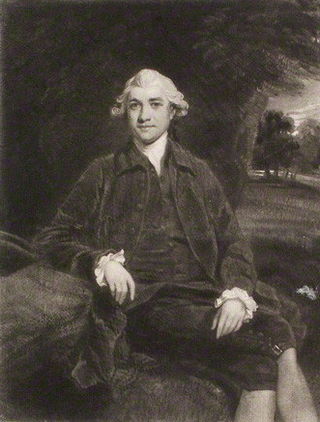
Edward Craggs-Eliot, 1st Baron Eliot was an English official and politician who sat in the House of Commons from 1748 to 1784, when he was raised to the peerage as Baron Eliot.
Nicholas Richard Michael Eliot, 9th Earl of St Germans was a British peer.
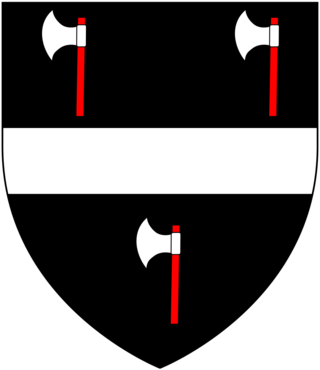
The Wrey Baronetcy, of Trebitch in the Duchy of Cornwall, is a title in the Baronetage of England. It was created on 30 June 1628 for William Wrey (d.1636), 2nd son of John Wrey of Trebeigh, St Ive, Cornwall, a member of an ancient Devon family. The third Baronet was a supporter of the Royalist cause and sat as Member of Parliament for Lostwithiel after the Restoration. He married Lady Anne, third daughter and co-heir of Edward Bourchier, 4th Earl of Bath, and a co-heir to the barony of Fitzwarine. The fourth Baronet represented Liskeard and Devon in the House of Commons. The fifth Baronet was Member of Parliament for Camelford while the sixth Baronet represented Barnstaple.

The Eliot family is a British aristocratic family whose members include earls, barons, counts, knights, governors, peers, and Members of Parliament. The main factions are the Earls of St Germans and the Eliot Military Family, which encompasses the Count Eliots.

